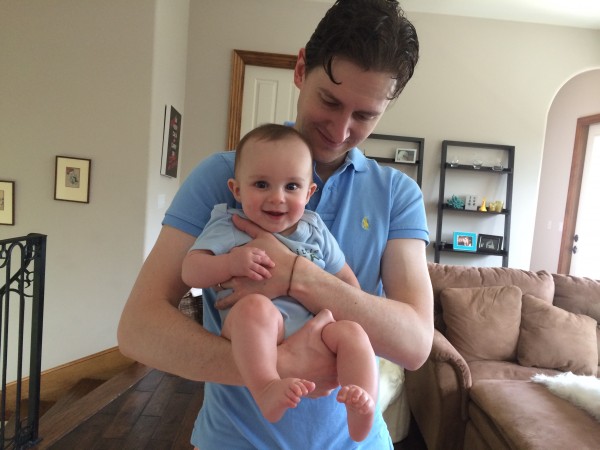why paternity leave is important too

-
Category
Fashion & Style

In case you haven't been following this issue, paternity leave -- paid or unpaid time off that new dads take to spend with their kids -- has been a hot topic lately. It's an issue that Chad and I have spent a lot of time discussing and planning in the last few months, and I thought it might be valuable to talk a little bit about our perspective.
In case you haven't been following, here's a quick summary. Currently, the United States is the only industrialized nation that doesn't offer any type of paid leave for new parents. Thanks to the Family Medical Leave Act, larger employers must offer 12 weeks of unpaid leave to new parents. That's it.
Now, that's a problem for new moms. It means that lots of moms have to go back to work earlier than they'd like, or need to make hard choices about their careers and the ability to balance a family.
But there is a deeper problem. And one that a lot of people don't think about.
When we talk about parental leave, we mean maternity leave.
As in: Only women take it.
As in: Only women are offered it, much of the time.
But raising children isn't just the job of the mom anymore. Studies show that the happiest households are those that with dads who do chores and spend time with kids. Not only do those moms get more satisfaction out of their marriages, but dads do too.
The fact is: the disengaged dad is a relic. We don't live in a society where, like Don Draper, dad comes home on the evening train with a cocktail after the kids are in bed. It's not true in any family I know -- instead, dads value their time with their children as much as moms do, and our parental leave policies should reflect that.
And Chad and I were extremely lucky. We had a situation that any new family would dream of: my husband was permitted a generous amount of paid leave from his law firm. An amount that many moms don't get, let alone dads.
And I was nervous. Paternity leave isn't as widely accepted as maternity leave, and I wondered: Would this affect his future career? What doors would close because he made this choice? Would people be angry that he took time away from his job, for the mere purpose of spending time with our son?
Then suddenly I realized: those are the questions that face every woman who has taken maternity leave. Paid or unpaid. What repercussions would this have for her career? What sacrifices are she willing to make, to take time with her children?
Sure, there are some biological reasons that moms have to make these choices more often than dads do. But they are important to both genders. Moms and Dads have to make these decisions. Pretending that this is only an issue for moms keeps parental leave as a women's issue, and it quite nearly guarantees that we will never make progress in getting to a solution that works.
But parental leave isn't a women's issue. It's an issue for parents: men, women, gay parents, adoptive parents, everyone.
And you know what? When Chad was home more, spending time with the baby, his perspective changed. Up until then, I had been the primary caretaker of our son, and he just didn't understand what I meant when I said that it had been a hard day. His perspective was different: no matter how hard a baby was, it wasn't as hard as being a lawyer (I confess: I felt the same way before our baby was born).
Then, we had a morning where Chad took care of Bear on a particularly fussy day, and I slept in (yes, I was up all night and then handed the baby off at 7 am and slept till 10, and it was the best thing ever).
And when I came downstairs to see them, he told me: "I know what you mean, now. It's really hard."
And you guys, I melted. Months after my worst day, when I was all but immune to those tough days when the baby crying never seems to end, it meant so much to me to have it recognized by my husband. To have him say, "I understand what you've been struggling with, these past months. I get it now."
And who knows? Maybe we would have gotten there without parental leave, but maybe not. I am still working; my career is fundamentally important to me, but balancing our son and my work has been incredibly challenging, like it is for any mom. And to have a dad who understands that balance, who knows what you're going through on a bad day: it's invaluable.
It makes two parents into partners.
So when we advocate for leave for moms, I think we should be advocating for dads too. It's families that need this help.
Placing the burden solely on moms is never going to fix this problem. But advocating for leave policies for both men and women, for retiring those outdated gender stereotypes -- I think that's what's crucial for us all to move forward.
So let's figure out how to get there.

